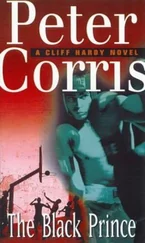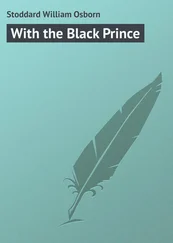Iris Murdoch - The Black Prince
Здесь есть возможность читать онлайн «Iris Murdoch - The Black Prince» весь текст электронной книги совершенно бесплатно (целиком полную версию без сокращений). В некоторых случаях можно слушать аудио, скачать через торрент в формате fb2 и присутствует краткое содержание. Год выпуска: 1973, Жанр: Классическая проза, на английском языке. Описание произведения, (предисловие) а так же отзывы посетителей доступны на портале библиотеки ЛибКат.
- Название:The Black Prince
- Автор:
- Жанр:
- Год:1973
- ISBN:нет данных
- Рейтинг книги:4 / 5. Голосов: 1
-
Избранное:Добавить в избранное
- Отзывы:
-
Ваша оценка:
- 80
- 1
- 2
- 3
- 4
- 5
The Black Prince: краткое содержание, описание и аннотация
Предлагаем к чтению аннотацию, описание, краткое содержание или предисловие (зависит от того, что написал сам автор книги «The Black Prince»). Если вы не нашли необходимую информацию о книге — напишите в комментариях, мы постараемся отыскать её.
The Black Prince
First published in 1973
To Ernesto de Marchi
The Black Prince — читать онлайн бесплатно полную книгу (весь текст) целиком
Ниже представлен текст книги, разбитый по страницам. Система сохранения места последней прочитанной страницы, позволяет с удобством читать онлайн бесплатно книгу «The Black Prince», без необходимости каждый раз заново искать на чём Вы остановились. Поставьте закладку, и сможете в любой момент перейти на страницу, на которой закончили чтение.
Интервал:
Закладка:
I gave myself up to the course of events with a certain resignation and without screams of protest, for another and deeper reason too, which had to do with Julian. Or perhaps there were two reasons here, one lying above the other. Or perhaps three. What did I believe that Julian thought about what had happened? In a strange way I was almost entirely agnostic about what Julian thought. I did not imagine that she saw me as a murderer. But neither did I expect her to defend me by accusing her mother. My love for Julian had somehow brought about this death. (This piece of causality I was quite clear about.) And my responsibility for it I was prepared to lodge forever in the mystery of my love for Julian and her love for me. That was part of it. But I also felt something like this, that the emergence of my life out of quietness into public drama and horror was a necessary and in some deep sense natural outcome of the visitation with which I had been honoured. Sometimes I thought of it as a punishment for the failure of my vow of silence. Sometimes, shifting the same idea only very slightly, it seemed more like a reward. Because I loved Julian something huge had happened to me. I had been given the privilege of an ordeal. That I suffered through her and for her was, in addition, a delightful, almost frivolous comfort.
The court saw me, as I have said, as a fantastical man. Little did they know how fantastical I was, though not in their crude sense. It is the literal truth that the image of Julian was not absent from my mind for a single second during the waking hours of those terrible days. I apprehended at the same time her absolute presence and her absolute absence. There were moments when I felt as if I were being literally torn to pieces by love. (What must it be like to be eaten by a large animal? I felt I knew.) This pain, from which I almost fainted, once or twice came upon me when I was addressing the court, and abruptly stopped my utterance, thereby giving comfort to the insanity lobby. Perhaps the only thing which made me survive this period of thinking about Julian was the complete absence of hope. A grain of hope present at that time would have killed me.
The psyche, desperate for its survival, discovers deep things. How little most so-called psychologists seem to know about its shifts and its burrowings. At some point in a black vision I apprehended the future. I saw this book, which I have written, I saw my dearest friend P. L., I saw myself a new man, altered out of recognition. I saw beyond and beyond. The book had to come into being because of Julian, and because of the book Julian had to be. It was not, though indeed time matters little to the unconscious mind, that the book was the frame which she came to fill, nor was she the frame which the book filled. She somehow was and is the book, the story of herself. This is her deification and incidentally her immortality. It is my gift to her and my final possession of her. From this embrace she can never now escape. But, and this is not to belittle my darling, I saw much more than this in the black glass of the future. And this is, if I can express it, the deepest reason why I accepted the unjust judgment of the court.
I felt that every single thing that was happening to me was not just predestined but somehow actively at the moment of its occurrence thought by a divine power which held me in its talons. At times I felt almost as if I were holding my breath in case some tiny movement of my own should interfere with the course of this divine possession. Though in the same thought I also knew that I could not now, by the most frenzied struggling, ever escape my fate. The courtroom and the judge and the condemnation for life were mere shadows of a much huger and more real drama of which I was the hero and the victim. Human love is the gateway to all knowledge, as Plato understood. And through the door that Julian opened my being passed into another world.
About these things, my dear fellow, we in our seclusion have often spoken, in our times of quietness together, with words whose meaning glowed out of an ineffable understanding, like flames upon dark water. So friends, so spirits, ultimately converse. It was for this that Plato, in his wisdom, forbade the artists. Socrates wrote nothing, neither did Christ. Almost all speech which is not so illumined is a deformation of the truth. And yet: I am writing these words and others whom I do not know will read them. With and by this paradox I have lived, dear friend, in our sequestered peace. Perhaps it will always be for some an unavoidable paradox, but one which is only truly lived when it is also a martyrdom.
I do not know whether I shall see the «outside world» again. (A curious phrase. The world is, in reality, all outside, all inside.) The question is of no interest to me. A truthful vision finds the fullness of reality everywhere and the whole extended universe in a little room. That old brick wall which we have so often contemplated together, my dear friend and teacher: how could I find words to express its glowing beauty, lovelier and more sublime than the beauty of hills and waterfalls and unfolding flowers? These are indeed vulgarisms, commonplaces. What we have seen together is a beauty and a glory beyond words, the world transfigured, found. It was this, which in the bliss of quietness I now enjoy, which I glimpsed prefigured in madness in the water-colour blue eyes of Julian Baffin. She images it for me still in my dreams, as the icons of childhood still haunt the visions of the ageing sage. May it be always so, for nothing is lost, and even at the end we are ever at the beginning.
And I found you, my friend, the crown of my quest. Could you not have existed, could you not have been waiting for me in this monastery which we have inhabited together? That is impossible, my dear. Were you there by accident? No, no, I should have had to invent you, and by the power which you yourself bestow I should have been able to. Now indeed I can see my life as a quest and an ascesis, but lost until the end in ignorance and dark. I was seeking you, I was seeking him, and the knowledge beyond all persons which has no name at all. So I sought you long and in sorrow, and in the end you consoled me for my lifelong deprivation of you by suffering with me. And the suffering became joy.
So we live on together here in our quiet monastery, as we are pleased to call it. And so I come to the end of this book. I do not know if I shall write another. You have taught me to live in the present and to forswear the fruitless anxious pain which binds to past and to future our miserable local arc of the great wheel of desire. Art is a vain and hollow show, a toy of gross illusion, unless it points beyond itself and moves ever whither it points. You who are a musician have shown me this, in the wordless ultimate regions of your art, where form and substance hover upon the brink of silence, and where articulate forms negate themselves and vanish into ecstasy. Whether words can travel that path, through truth, absurdity, simplicity, to silence I do not know, nor what that path can be like. I may write again. Or may at last abjure what you have made me see to be but a rough magic.
This book has been in some way the story of my life. But it has also been, I hope, an honest tale, a simple love story. And I would not wish it to seem at the end that I have, in my own sequestered happiness, somehow forgotten the real being of those who have figured as my characters. I will mention two. Priscilla. May I never in my thought knit up the precise and random detail of her wretchedness so as to forget that her death was not a necessity. And Julian. I do not, my darling girl, however passionately and intensely my thought has worked upon your being, really imagine that I invented you. Eternally you escape my embrace. Art cannot assimilate you nor thought digest you. I do not now know, or want to know, anything about your life. For me, you have gone into the dark. Yet elsewhere I realize, and I meditate upon this knowledge, that you laugh, you cry, you read books and cook meals and yawn and lie perhaps in someone's arms. This knowledge too may I never deny, and may I never forget how in the humble hard time-ridden reality of my life I loved you. That love remains, Julian, not diminished though changing, a love with a very clear and a very faithful memory. It causes me on the whole remarkably little pain. Only sometimes at night when I think that you live now and are somewhere, I shed tears.
Читать дальшеИнтервал:
Закладка:
Похожие книги на «The Black Prince»
Представляем Вашему вниманию похожие книги на «The Black Prince» списком для выбора. Мы отобрали схожую по названию и смыслу литературу в надежде предоставить читателям больше вариантов отыскать новые, интересные, ещё непрочитанные произведения.
Обсуждение, отзывы о книге «The Black Prince» и просто собственные мнения читателей. Оставьте ваши комментарии, напишите, что Вы думаете о произведении, его смысле или главных героях. Укажите что конкретно понравилось, а что нет, и почему Вы так считаете.










